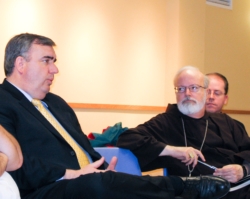Cardinal, groups, BPD commissioner meet to tackle violence
DORCHESTER -- Attempting to find ways to bridge the gap between police and youth in order to stem the violence in the streets of Boston, Cardinal Seán P. O’Malley, Boston Police Commissioner Ed Davis and representatives from the Boston Catholic Youth Connection (BCYC) met at the Catholic Charities Yawkey Center April 30.
“All of us feel a great deal of frustration as we see the violence continuing,” Cardinal O’Malley said. “The community has a long way to go, but meeting here tonight is a step in the right direction.”
“The police department is here to serve you,” Davis told those gathered. “I think we’re going to get a handle on [the violence] but we’re only going to do this through you and the communities you represent.”
Over 50 people, representing a dozen inner-city parishes, met to brainstorm on actions their parishes could take to help reduce the violence in their neighborhoods.
“We are here to talk about what we have done that has worked, and how we can work to establish stronger programs that can end youth violence,” began Father Paul Soper, pastor of Blessed Mother Teresa of Calcutta Parish in Dorchester, who moderated the event.
The group began by speaking about the programs currently underway in their parishes -- programs such as the Catholic Charities Teen Center, where over 240 teens have enlisted and participate in the center’s programs, and the Peace Garden in St. Mary of the Angels in Roxbury, where, according to youth leader Maria Cabrera, teens gather during the summer months to pray, to dance, and to enjoy themselves.
All the representatives agreed that programs such as the Peace Garden or the Catholic Charities Teen Center in Dorchester attract other teens to the Catholic Church. In addition, these programs serve to “break down barriers,” according to Carol Nesti, youth leader at St. Mark Parish in Dorchester.
“Neighborhood barriers are so strong,” Nesti said, “and the BCYC is breaking down those barriers, which is necessary if we are to prevent violence.”
Father Soper asked the participants -- particularly the youth who experience the problem of violence firsthand -- for ideas on how the Catholic Church can reach out to high-risk youth.
“I don’t really know what the Church can do,” confessed Lauren Mountain, a high school senior and member of the youth group at St. Mark’s. “Basically, you just need to find the interest -- you have to pinpoint what each parish needs. Everyone has their own stories of how they were affected by violence -- just hearing those stories helps people come together.”
However, when it came to ideas on how to expand programs to draw in teens not currently involved in the parishes, lack of funds was frequently cited as a stumbling block.
“We need to come up with solutions no matter what the cost,” urged Father Oscar Pratt, pastor of St. Katherine Drexel Parish in Roxbury. “The need is there, and the need is imminent.”
According to Father Pratt, the Church must reach out to the entire community in order to reduce violence.
“To be insular is not to be Catholic,” he said. “Our mission as pastors is to guard all the souls within a territory, not just card-carrying Catholic souls, but all souls.”
“Those being affected, they’re all of our youth, they’re all of our children,” he stressed.
In addition, many of the parish representatives agreed there is a lack of trust between neighborhood teens and Boston Police.
“It is crucial to build relationships between police and youth,” said Paulo De Barros, director of the Teen Center in Dorchester. “We need to work on building that relationship. Teens need to trust the police, and the police need to trust the teens.”
“Teens and police do not see eye to eye,” agreed high school junior Matthew, a youth group member at Blessed Mother Teresa of Calcutta Parish in Dorchester. He suggested that Commissioner Davis set up a Boston Police Department group for teens aimed at helping “not just good kids, but bad kids and average kids” speak to others about preventing violence. “If people see you don’t need to fear the police anymore, you can get other teens to join in,” he said.
Davis agreed with that proposal, adding that the police department is currently looking at opportunities to coach sports teams and involve themselves in community projects to “make sure that officers get to know people.”
Davis concluded the evening by asking the parishes to “act as a bridge” for the police department.
“Find out from the kids what kind of programming they want,” he urged, adding that “the police are ready, willing and able to stop by and get to know the youth.”



















